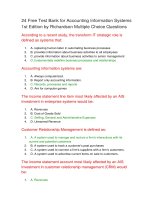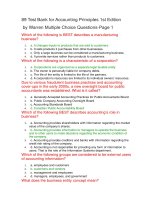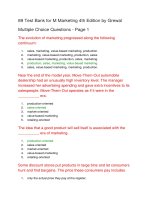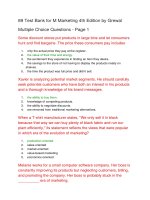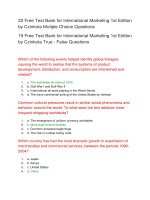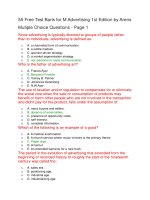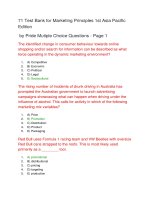89 test bank for accounting principles 1st edition
Bạn đang xem bản rút gọn của tài liệu. Xem và tải ngay bản đầy đủ của tài liệu tại đây (52.61 KB, 16 trang )
89 Test Bank for Accounting Principles 1st Edition
by Warren Multiple Choice Questions-Page 1
Which of the following is BEST describes a manufacturing
business?
1.
2.
3.
4.
a. It changes inputs to products that are sold to customers.
b. It sells products it purchases from other businesses.
c. Only a large business can be considered a manufacturing business.
d. It provide services rather than products to customers.
Which of the following is a characteristic of a corporation?
1.
2.
3.
4.
a. Corporations are organized as a separate legal taxable entity.
b. The owner is personally liable for company debts.
c. The life of the entity is limited to the life of the partners.
d. A corporation’s resources are limited to its individual owners’ resources.
Due to various fraudulent business practices and accounting
cover-ups in the early 2000s, a new oversight board for public
accountants was established. What is it called?
1.
2.
3.
4.
a. Generally Accepted Accounting Practices for Public Accountants Board
b. Public Company Accounting Oversight Board
c. Accounting Standards Board
d. Canadian Public Accountability Board
Which of the following BEST describes accounting’s role in
business?
1.
a. Accounting provides shareholders with information regarding the market
value of the company’s shares.
2. b. Accounting provides information to managers to operate the business
and to other users to make decisions regarding the economic condition of
the company.
3. c. Accounting provides creditors and banks with information regarding the
credit risk rating of the company.
4. d. Accounting is not responsible for providing any form of information to
users. That is the role of the Information Systems department.
Which of the following groups are considered to be external users
of accounting information?
1.
2.
3.
4.
a. employees and customers
b. customers and vendors
c. management and employees
d. managers, employees, and government
What does the business entity concept mean?
1.
2.
3.
4.
a. The owner is part of the business entity.
b. An entity is organized according to provincial or federal charters.
c. An entity is organized according to the rules set by the AcSB.
d. The entity is an individual economic unit for which data are recorded,
analyzed, and reported.
What does the reliability characteristic require?
1.
a. Business transactions must be consistent with the objectives of the
entity.
2. b. The Accounting Standards Board must be fair and unbiased in its
deliberations over new accounting standards.
3. c. Accounting principles must meet the objectives of the provincial security
regulatory body.
4. d. Amounts recorded in the financial statements must be based on
independently verifiable evidence.
Which of the following is NOT true of accounting principles?
1.
a. Financial accountants follow generally accepted accounting principles
(GAAP).
2. b. Following GAAP allows accounting information users to compare one
company to another.
3. c. A new accounting principle can be adopted with shareholders’ approval.
4. d. Accounting principles develop from research, accepted accounting
practices, and pronouncements of authoritative bodies.
What do managerial accountants provide?
1.
2.
3.
4.
a. tax reports to government agencies
b. profit reports to owners and management
c. reports to management regarding expansion of a product line
d. consumer reports to customers
What does the cost principle involve?
1.
2.
3.
4.
a. the reliability characteristic and the monetary unit principle
b. relevance and verifiability characteristics
c. timeliness and understandability characteristics
d. relevance and reliability characteristics
For accounting purposes, the business entity should be
considered separate from its owners if the entity is which of the
following?
1.
2.
3.
4.
a. a corporation
b. a proprietorship
c. a partnership
d. a corporation, a proprietorship , or a partnership
Why do shareholders in a corporation have an interest in the
company?
1.
2.
a. They provide incentives for the company to market its products.
b. They are part of the Marketing Department that is responsible for
promoting the products or services to increase business profits.
3. c. They help market the products to customers or find vendors to supply
needed inputs.
4. d. They provide major financing for the business.
Which of the following describes the monetary unit concept?
1.
2.
3.
4.
a. It is used only in the financial statements of manufacturing companies.
b. It is not important when applying the cost principle.
c. It requires that different units be used for assets and liabilities.
d. It requires that economic data be reported in yen in Japan or dollars in
Canada.
Which of the following is NOT a business transaction?
1.
2.
3.
4.
a. Make a sales offer.
b. Sell goods for cash.
c. Receive cash for services to be rendered later.
d. Pay for supplies.
Which of the following items is NOT a business entity?
1.
2.
3.
4.
a. entrepreneurship
b. proprietorship
c. partnership
d. corporation
Which of the following BEST describes accounting?
1.
a. It records economic data but does not communicate the data to users
according to any specific rules.
2. b. It is an information system that provides reports to users.
3. c. It is of no use by individuals outside the business.
4. d. It is used only for filling out tax returns and for financial statements for
various types of governmental reporting requirements.
Which of the following are all examples of merchandising
businesses?
1.
2.
3.
4.
a. Air Canada, Holiday Inn, Gap
b. Gap, Chapters, Bombardier
c. Future Shop, Sony, Dell
d. Future Shop, Best Buy, Gap
Which of the following authoritative body has the primary
responsibility for developing accounting principles?
1.
2.
3.
4.
a. AcSB
b. CRA
c. OSC
d. CMA
What does earning revenue do?
1.
2.
3.
4.
a. It increases assets and increases owner’s equity.
b. It increases assets and decreases owner’s equity.
c. It increases one asset and decreases another asset.
d. It decreases assets and increases liabilities.
What are the debts owed by a business?
1.
2.
3.
4.
a. accounts receivables
b. equities
c. owner’s equity
d. liabilities
What are the owned resources of a business?
1.
2.
3.
4.
a. assets
b. liabilities
c. equities
d. revenues
Which of the following groups are considered to be internal users
of accounting information?
1.
2.
3.
4.
a. employees and customers
b. customers and vendors
c. employees and managers
d. government and banks
Equipment with an estimated market value of $55,000 is offered
for sale at $75,000. The equipment is acquired for $20,000 in
cash and a note payable of $40,000 due in 30 days. What is the
amount used in the buyer’s accounting records to record this
acquisition?
1.
2.
3.
4.
a. $20,000
b. $55,000
c. $60,000
d. $75,000
Which of the following are certifications for accountants?
1.
2.
3.
4.
a. CA, CMA, and CGA
b. CMA, CGA, and AcSB
c. CGA, CPAB, and CA
d. GAAP, CA, and CGA.
What is the monetary value charged to customers for the
performance of services sold called?
1.
2.
3.
4.
a. an asset
b. net income
c. capital
d. revenue
Which of the following are guidelines for behaving ethically? I.
Identify the consequences of a decision and its effect on others;
II. Consider your obligations and responsibilities to those affected
by the decision; III. Identify your decision based on personal
standards of honesty and fairness.
1.
2.
3.
4.
a. I and II.
b. II and III.
c. I and III.
d. I, II, and III.
Darnell Company purchased $88,000 of computer equipment
from Joseph Company. Darnell Company paid for the equipment
using cash that had been obtained from the initial investment by
Donnie Darnell. The transaction involving the computer
equipment should be recorded on the accounting records of
which of the following entities?
1.
2.
3.
4.
a. Darnell Company and Donnie Darnell’s personal records
b. Joseph Company and Donnie Darnell’s personal records
c. Darnell Company and Joseph Company
d. Joseph Company
Suppose that total liabilities decreased by $55,000 during a
period of time and owner’s equity increased by $60,000 during
the same period. What would be the amount and direction
(increase or decrease) of the period’s change in total asset?
1.
2.
3.
4.
a. a $115,000 increase
b. a $115,000 decrease
c. a $5,000 increase
d. a $5,000 decrease
How are most businesses in Canada set up?
1.
2.
3.
4.
a. as sole proprietorships
b. as partnerships
c. as corporations
d. as separate entities
What does GAAP stand for?
1.
2.
3.
4.
a. General Accounting Procedures
b. Generally Accepted Plans
c. Generally Accepted Accounting Principles
d. Generally Accepted Accounting Practices
Which of the following is NOT an asset?
1.
2.
3.
4.
a. investments
b. cash
c. inventory
d. owner’s equity
Which of the following concepts relates to separating the
reporting of business and personal economic transactions?
1.
2.
3.
4.
a. cost principle
b. monetary unit concept
c. business entity concept
d. reliability characteristic
Which two common areas of accounting respectively provide
information to internal and external users?
1.
2.
3.
4.
a. forensic accounting and financial accounting
b. managerial accounting and financial accounting
c. managerial accounting and environmental accounting
d. financial accounting and tax accounting systems
Who uses financial reports?
1.
2.
3.
4.
a. management
b. creditors
c. investors
d. management, creditors, and investors all use financial reports
Select the type of business that is most likely to obtain large
amounts of resources by issuing shares.
1.
2.
3.
4.
a. partnership
b. corporation
c. proprietorship
d. entrepreneurship
The assets and liabilities of the company are $175,000 and
$40,000, respectively. Owner’s equity should equal which of the
following?
1.
2.
a. $215,000
b. $175,000
3.
4.
c. $135,000
d. $40,000
Which entity is organized according to provincial or federal
charters and has it ownership divided into shares?
1.
2.
3.
4.
a. a proprietorship
b. a corporation
c. a partnership
d. a governmental unit
Which of the following would NOT normally operate as a service
business?
1.
2.
3.
4.
a. pet groomers
b. restaurant
c. video rentals
d. styling salon
Which of the following BEST describes assets?
1.
2.
3.
4.
a. They are always greater than liabilities.
b. They are either cash or accounts receivables.
c. They are the same as expenses because they are acquired with cash.
d. They are financed by the owner and/or creditors.
How can the accounting equation be expressed?
1.
2.
3.
4.
a. Assets = Equities – Liabilities
b. Assets + Liabilities = Owner’s Equity
c. Assets = Revenues less Liabilities
d. Assets – Liabilities = Owner’s Equity
What are the fundamental qualitative characteristics that define
information in financial statements?
1.
2.
3.
4.
a. verifiability and timeliness characteristics
b. business entity and the monetary unit concepts
c. cost principle and understandability characteristic
d. relevance and reliability characteristics
Currently, the dominant body in the development of accounting
principles is which of the following?
1.
2.
3.
4.
a. Accounting Standards Board (AcSB)
b. Canadian Public Accountability Board (CPAB)
c. Ontario Securities Commission (OSC)
d. Society of Management Accountants (SMA)
Donner Company is selling a piece of land adjacent to its
business. An appraisal reported the market value of the land to be
$120,000. The Focus Company initially offered to buy the land for
$107,000. The companies settled on a purchase price of
$115,000. On the same day, another piece of land on the same
block sold for $122,000. Under the cost principle, what is the
amount that will be used to record this transaction in the
accounting records?
1.
2.
3.
4.
a. $107,000
b. $115,000
c. $120,000
d. $122,000
Which of the following is INCORRECT about the accounting
equation and its elements?
1.
2.
3.
4.
a. The accounting equation is Assets = Liabilities – Owners’ Equity.
b. Assets are the resources a business possesses.
c. Liabilities represent debts of a business.
d. Examples of assets are cash, land, buildings, and equipment.
A business paid $7,000 to a creditor in payment of an amount
owed. What was the effect of the transaction on the accounting
equation?
1.
2.
3.
4.
a. It increased an asset and decreased another asset.
b. It decreased an asset and decreased a liability.
c. It increased an asset and increased a liability.
d. It increased an asset and increased owner’s equity.
Recently, owner Denzel withdrew $18,000 from his company,
Crystal Cleaning, and he contributed $14,000, in his name, to
Habitat for Humanity. The contribution of the $14,000 should be
recorded on the accounting records of which of the following
entities?
1.
2.
3.
4.
a. Crystal Cleaning and Habitat for Humanity
b. Denzel Jones’s personal records and Habitat for Humanity
c. Denzel Jones’s personal records and Crystal Cleaning
d. Denzel Jones’s personal records, Crystal Cleaning, and Habitat for
Humanity
Which of the following is NOT a role of accounting in business?
1.
a. providing reports to users about the economic activities and conditions of
a business
2. b. personally guaranteeing loans of the business
3. c. providing information to other users to determine the economic
performance and condition of the business
4.
d. assessing the various informational needs of users and designing the
organization’s accounting system to meet those needs
Profit is the difference between which of the following?
1.
2.
3.
a. assets and liabilities
b. the incoming cash and outgoing cash
c. the assets purchased with cash contributed by the owner and the cash
spent to operate the business
4. d. the assets received for goods and services and the amounts used to
provide the goods and services
89 Free Test Bank for Accounting Principles 1st
Canadian Edition by Warren Multiple Choice
Questions-Page 2
Suppose that beginning capital was $70,000, ending capital is
$48,000, and the owner’s withdrawals were $21,000. What is the
amount of net income or net loss?
1.
2.
3.
4.
a. net income of $42,000
b. net income of $17,000
c. net loss of $22,000
d. net loss of $1,000
Gomez Service Company paid its first installment on its Notes
Payable in the amount of $2,000. How will this transaction affect
the accounting equation?
1.
2.
a. Increase Liabilities (Notes Payable); decrease Assets (Cash).
b. Decrease Assets (Cash); decrease Owner’s equity (Note Payable
Expense).
3. c. Decrease Assets (Cash); decrease Assets (Notes Receivable).
4. d. Decrease Assets (Cash); decrease Liabilities (Notes Payable).
Where does the year-end balance of the owner’s capital account
appear?
1.
2.
3.
4.
a. in both the statement of owner’s equity and the income statement
b. in only the statement of owner’s equity
c. in both the statement of owner’s equity and the balance sheet
d. in both the statement of owner’s equity and the cash flow statement
A financial statement user would determine if a company was
profitable or not during a specific period of time by reviewing
which of the following?
1.
2.
a. the income statement
b. the balance sheet
3.
4.
c. the cash flow statement
d. cannot be determined
What do owner’s withdrawals do?
1.
2.
3.
4.
a. They increase expenses.
b. They decrease expenses.
c. They increase cash.
d. They decrease owner’s equity.
When are expenses recorded?
1.
2.
3.
4.
a. when cash is paid for services received
b. when a bill is received in advance of services received
c. when services are received
d. when creditors are paid on account
If an owner wanted to know how money flowed into and out of the
company, what financial statement would she use?
1.
2.
3.
4.
a. income statement
b. cash flow statement
c. balance sheet
d. statement of owners equity
How does the rendering of services on account affect the
accounting equation?
1.
2.
3.
4.
a. assets increase; owner’s equity increases
b. assets decrease; owner’s equity decreases
c. assets increase; owner’s equity decreases
d. liabilities increase; owner’s equity decreases
Which of the following increases owner’s equity?
1.
2.
3.
4.
a. cash
b. revenue
c. accounts receivable
d. withdrawals
Simpson Auto Body Repair purchased $20,000 of Machinery. The
company paid $8,000 in cash at the time of the purchase and
signed a promissory note for the remainder to be paid in four
monthly installments. How will this transaction affect the
accounting equation?
1.
a. Increase Assets (Machinery $20,000); decrease Liabilities (Accounts
Payable $20,000).
2. b. Increase Total Assets by a net amount of $12,000 (increase Machinery
$20,000 and decrease Cash $8,000); increase Liabilities (Notes Payable
$12,000).
3.
c. Increase Total Assets by a net amount of $20,000 (increase Machinery
$12,000 and increase Cash $8,000); and decrease Liabilities (Accounts
Payable $20,000).
4. d. Increase Assets (Machinery $12,000); increase Liabilities (Accounts
Payable $12,000).
Which of the following is NOT a primary financial statement?
1.
2.
3.
4.
a. income statement
b. statement of resources owned
c. statement of owner’s equity
d. cash flow statement
Four financial statements are usually prepared for a business.
The statement of owner’s equity (OE), the balance sheet (B), and
the income statement (I) are prepared in a certain order to obtain
information needed for the next statement. In what order are
these three statements prepared?
1.
2.
3.
4.
a. income statement, statement of owner’s equity, balance sheet
b. balance sheet, income statement, statement of owner’s equity
c. statement of owner’s equity, income statement, balance sheet
d. balance sheet, statement of owner’s equity, income statement
When are revenues reported?
1.
2.
3.
4.
a. when a contract is signed
b. when cash is received from the customer
c. when work is begun on the job
d. when work is completed on the job
How does the collection of cash from a customer who was
previously put on account affect the accounting equation?
1.
2.
3.
4.
a. assets decrease; owner’s equity decreases
b. assets increase; owner’s equity increases
c. assets increase; assets decrease
d. assets increase; liabilities increase
How does paying a liability in cash affect the accounting
equation?
1.
2.
3.
4.
a. assets increase; liabilities decrease
b. assets increase; liabilities increase
c. assets decrease; liabilities decrease
d. liabilities decrease; owner’s equity increases
Which of the following is NOT a financial statement of a
proprietorship?
1.
a. the statement of retained earnings
2.
3.
4.
b. the statement of owner’s equity
c. the income statement
d. the cash flow statement
What is the asset created by a business when it makes a sale on
account ?
1.
2.
3.
4.
a. accounts payable
b. prepaid expense
c. unearned revenue
d. accounts receivable
Ramierez Company received its first electric bill in the amount of
$60, which will be paid next month. How will this transaction affect
the accounting equation?
1.
a. Increase Liabilities (Accounts Payable); decrease Owner’s Equity
(Utilities Expense).
2. b. Increase Liabilities (Accounts Receivable); decrease Owner’s Equity
(Utilities Expense).
3. c. Decrease Assets (Cash); decrease Liabilities (Accounts Payable).
4. d. Decrease Assets (Cash); decrease Owner’s Equity (Utilities Expense).
Which of the following financial statements reports information as
of a specific date?
1.
2.
3.
4.
a. the income statement
b. the statement of owner’s equity
c. the cash flow statement
d. the balance sheet
On July 1 of the current year, the assets and liabilities of John
Wong, DVM, are as follows: Cash, $15,000; Accounts Receivable,
$12,300; Supplies, $3,100; Land, $35,000; Accounts Payable,
$8,700. What is the amount of owner’s equity (John Wong’s
capital) as of July 1 of the current year?
1.
2.
3.
4.
a. $43,700
b. $56,700
c. $65,400
d. $74,100
Allen Marks is the sole owner and operator of Great Marks
Company. As of the end of its accounting period, December 31,
2011, Great Marks Company has assets of $940,000 and
liabilities of $300,000. During 2012, Allen Marks invested an
additional $65,000 and withdrew $45,000 from the business.
What is the amount of net income during 2012, assuming that as
of December 31, 2012, assets were $995,000, and liabilities were
$270,000?
1.
2.
3.
4.
a. $50,000
b. $65,000
c. $105,000
d. $370,000
Which of the following is NOT a business transaction?
1.
a. Erin deposits $15,000 in a bank account in the name of Erin’s Lawn
Service.
2. b. Erin provided services to customers earning fees of $600.
3. c. Erin purchased hedge trimmers for her lawn service, agreeing to pay the
supplier next month.
4. d. Erin pays her monthly personal credit card bill.
How does the purchase of supplies on account affect the
accounting equation?
1.
2.
3.
4.
a. assets increase; owner’s equity decreases
b. assets increase; liabilities increase
c. assets increase; liabilities decrease
d. liabilities increase; owner’s equity decreases
Four transactions directly affect owner’s equity. Which are the two
transactions that decrease owner’s equity?
1.
2.
3.
4.
a. owner’s withdrawals and expenses
b. revenues and expenses
c. owner’s investments and revenues
d. owner’s investments and expenses
Transactions affecting owner’s equity include which of the
following?
1.
2.
3.
a. owner’s investments and payment of liabilities
b. owner’s investments and owner’s withdrawals, revenues, and expenses
c. owner’s investments, revenues, expenses, and collection of accounts
receivable
4. d. owner’s withdrawals, revenues, expenses, and purchase of supplies on
account
How does receiving a bill to be paid next month for services
rendered affect the accounting equation?
1.
2.
3.
4.
a. assets decrease; owner’s equity decreases
b. assets increase; liabilities increase
c. liabilities increase; owner’s equity increases
d. liabilities increase; owner’s equity decreases
How does the purchase of equipment by signing a note affect the
accounting equation?
1.
2.
3.
4.
a. assets increase; assets decrease
b. assets increase; liabilities decrease
c. assets increase; liabilities increase
d. assets increase; owner’s equity increases
How does the asset section of the balance sheet normally present
assets?
1.
2.
3.
4.
a. in alphabetical order
b. in order of largest to smallest dollar amounts
c. in the order that they will be converted into cash
d. in no particular order
Collins Landscape Company purchased various landscaping
supplies on account to be used for landscape designs for its
customers. How will this business transaction affect the
accounting equation?
1.
2.
3.
a. Increase Assets (Supplies): increase Liabilities (Accounts Payable).
b. Increase Assets (Supplies); decrease Assets (Cash).
c. Increase Assets (Supplies); decrease Owner’s Equity (Supplies
Expense).
4. d. Increase Owner’s Equity (Supplies Expense); increase Liabilities
(Accounts Payable).
Where are cash investments made by the owner to the business
reported on the cash flow statement?
1.
2.
3.
4.
a. in the Financing Activities section
b. in the Investing Activities section
c. in the Operating Activities section
d. in the Supplemental Statement
Clifford Moore is starting his computer programming business and
has deposited an initial investment of $15,000 into the business
cash account. How will the accounting equation be affected?
1.
2.
a. Increase Assets (Cash); increase Liabilities (Accounts Payable).
b. Increase Assets (Cash); increase Owner’s Equity (Clifford Moore,
Capital).
3. c. Increase Assets (Accounts Receivable); decrease Liabilities (Accounts
Payable).
4. d. Increase Assets (Cash); increase Assets (Accounts Receivable).
What is the financial statement that presents a summary of the
revenues and expenses of a business for a specific period of
time, such as a month or year?
1.
2.
3.
4.
a. a prior-period statement
b. a statement of owner’s equity
c. an income statement
d. a balance sheet
Suppose total assets decreased by $88,000 during a period of
time and owner’s equity increased by 65,000 during the same
period. The amount and direction (increase or decrease) of the
period’s change in total liabilities is which of the following?
1.
2.
3.
4.
a. a $23,000 increase
b. an $88,000 decrease
c. a $153,000 increase
d. a $153,000 decrease
The cash flow statement is separated into three major sections.
What are they?
1.
2.
3.
4.
a. Operating, Investing, and Financing
b. Revenues, Expenses, and Net Income
c. Assets, Liabilities, and Owner’s Equity
d. Investments, Withdrawals, and Income
How does the owner’s withdrawing cash from the business affect
the accounting equation?
1.
2.
3.
4.
a. assets decrease; owner’s equity decreases
b. assets decrease; owner’s equity increases
c. assets increase; liabilities decrease
d. there is no effect on the assets, liabilities, or owner’s equity
Where are liabilities reported?
1.
2.
3.
4.
a. on the income statement
b. on the statement of owner’s equity
c. on the cash flow statement
d. on the balance sheet
Four transactions affect owner’s equity. Which are the two
transactions that increase owner’s equity?
1.
2.
3.
4.
a. revenues and expenses
b. expenses and owner’s withdrawals
c. revenues and owner’s investments
d. owner’s investments and expenses
Gomez Service Company has received $7,500 in cash for
services rendered. What effect does this transaction have on the
accounting equation?
1.
2.
3.
a. Increase Assets (Cash); decrease Owner’s Equity (Expenses).
b. Increase Assets (Cash); decrease Assets (Accounts Receivable).
c. Increase Assets (Accounts Receivable); increase Owner’s Equity (Fees
Earned).
4. d. Increase Assets (Cash); increase Owner’s equity (Fees Earned)
Ramon Ramos has withdrawn $750 from Ramos Repair
Company’s cash account to deposit in his personal account. How
does this transaction affect Ramos Repair Company’s accounting
equation?
1.
2.
a. Increase Assets (Accounts Receivable); decrease Assets (Cash).
b. Decrease Assets (Cash); decrease Owner’s Equity (Owner’s
Withdrawal).
3. c. Decrease Assets (Cash); decrease Liabilities (Accounts Payable).
4. d. Increase Assets (Cash); decrease Owner’s Equity (Owner’s Withdrawal).
What are goods purchased on account for future use in the
business, such as supplies, called?
1.
2.
3.
4.
a. prepaid liabilities
b. revenues
c. prepaid expenses
d. liabilities
What is the debt created by a business when it makes a purchase
on account?
1.
2.
3.
4.
a. an account payable
b. an account receivable
c. an asset
d. a prepaid expense
